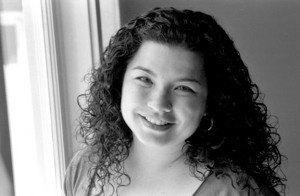As part of Ithaca College’s Distinguished Visiting Writers’ Series, the department of writing is bringing National Book Award Finalist Sarah Shun-lien Bynum to campus. She has written two novels, “Madeleine is Sleeping” and “Ms. Hempel Chronicles,” and is a writing professor at the University of California San Diego.

Assistant Accent Editor Megan Devlin spoke to Bynum about her recent honor as one of The New Yorker’s “20 Under 40” fiction writers, the inspiration for her award-winning novels and the development of her writing and teaching styles.
Megan Devlin: You were recently named a “20 Under 40” fiction writer. Was this after publishing “Ms.
Hempel Chronicles?”
Sarah Shun-lien Bynum: Yes. “Ms. Hempel Chronicles” came out a few years ago in 2008, and The New Yorker’s list was announced last June. They had read both my first book and my second book in making their decisions.
MD: How is your first novel different from your latest work?
SB: The first book works much more overtly with the fantastic, and the form is probably more unconventional since it’s made up of very short chapters. So on the surface it looks quite different from “Ms. Hempel Chronicles.” It’s more dreamlike and fragmented, but there are several similar obsessions running through both books. Even though their forms seem to be quite different, I think of them as being complementary too. They’re both really interested in childhood and the transformations that occur when you’re on the cusp of childhood and adulthood. … “Ms. Hempel Chronicles” is working in more of a realist mode and contemporary world, in a way that the world of “Madeleine” isn’t always immediately recognizable or familiar.
MD: Where are the overlaps in your writing and teaching styles?
SB: The principle that guides me in both my writing and my teaching is to be as compassionate as I can in how I’m thinking about my
characters and my students’ work — in the sense of really trying to understand the work on its own terms, rather than impose my own aesthetic sensibility onto a piece. I really try to get inside a piece and to understand from its own point of view what it wants to accomplish. I really try to teach my students to read each other’s work in that way.
MD: Where did you get the inspiration for these works?
SB: With “Madeline,” a lot of the early inspiration came out of the fairy tales I always loved reading as a child. … At the time, I was also reading a lot of French post-structuralism theory and feminist theory as well. There was definitely a strong theoretical influence running in that book. … With “Ms. Hempel Chronicles,” a lot of that material was drawn from my own experiences as a middle school teacher. I was using more autobiographical material in that book.
MD: When did you first begin writing and start to think of it as a career or something you’d want to pursue in the future?
SB: In terms of thinking about writing as something I love doing and want to get better at, it probably started at the beginning of high school. I had a really wonderful English teacher my freshman year — he encouraged me to keep on writing fiction, and I took a creative writing class with him the following year. … I’ve been taking classes and workshops pretty much since I was 15. I was lucky that I had chances to take classes and be in a community with other aspiring writers at a young age.
MD: As the next distinguished visiting writer, what will you be sharing with students in your presentation at the college?
SB: It’s so funny because you go in with a plan, but sometimes you end up departing from that plan. … At this point I’m planning to read the story that was published recently in The New Yorker for the “20 Under 40” issue, “The Earl King,” which is based on a German folk tale.
MD: Regardless of what you present, what do you hope students take away from your presentation?
SB: I hope they take away a sense that writing about seemingly mundane or quotidian experiences are experiences that are haunting or powerful for you as a writer. … You can write about something very close to home, but you can still find what is uncanny or surprising in the quotidian. You don’t have to look far for materials.
MD: What advice do you have for writers in order to help make their writing extraordinary?
BS: As writers we have so much we can draw upon and steal from and rift off of that this compulsion to be “original” is one that we don’t have to feel burdened by. There’s so much out there that we can appropriate in interesting ways. So I hope they come away with a sense of using the everyday and appropriating other stories are legitimate ways to create new fiction.
MD: Is there anything else you’d like to share?
SB: I’m just really looking forward to the visit and humbled by other writers who appeared in the series. Some of my favorite writers have appeared in the series, from Joy
Williams to Jennifer Eagen. I’m very excited to be coming.
To listen to a podcast of the interview, visit www.theithacan.org.




